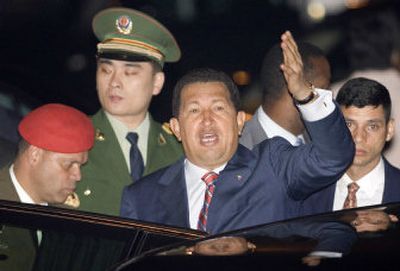Chavez: China backs U.N. bid

CARACAS, Venezuela – Venezuelan President Hugo Chavez said Thursday that China has endorsed his nation’s bid to win a seat on the United Nations Security Council, a move strongly opposed by the United States.
The announcement came as Chavez outlined a dozen bilateral trade deals, including plans to triple Venezuelan oil exports to the Asian nation by 2010.
Closing his state visit to Beijing, Chavez said he sees stronger relations with China as a means of creating a “multipolar” world and lessening the “hegemony” of the United States.
“We are creating a strategic alliance with the strength of the Great Wall,” Chavez told a meeting of Chinese and Venezuelan leaders.
Earlier, Chavez told reporters that China had joined Russia in becoming the second of five permanent Security Council members to support his U.N. bid. There was no official Chinese statement.
The United States favors Guatemala for the rotating Latin America seat on the 15-member council. U.S.-Venezuela relations have deteriorated in recent years, and increasingly are marked by sniping by officials on both sides.
The U.S. embassy here has accused Chavez of waging a campaign of harassment against U.S. diplomatic officials. On Thursday, the embassy lodged a formal protest against what it termed a breach of “diplomatic norms” after Venezuelan officials intercepted and searched an unspecified diplomatic shipment.
It is unclear how many votes Chavez can count on in the October balloting, which will be secret. All 192 members of the General Assembly vote in rounds until the winning nation garners two thirds of ballots.
Several Latin American nations have come out against Chavez, including Colombia, a major recipient of U.S. aid. Brazil and Argentina support Venezuela’s bid. Chile has not publicly declared its intentions.
The United States has said Chavez would be a disruptive and “non-consensus-building” member of the council akin to Iran or Cuba. Chavez counters that the United States opposes views that diverge from its own, especially in the same hemisphere.
What is certain is that China and Venezuela are strengthening commercial ties, especially in energy. Venezuela now exports to China 160,000 barrels a day of oil, refined fuels and a hydrocarbon called Orimulsion used in power plants, according to the state-run Xinhua news agency.
Chavez told officials in Beijing’s Great Hall that exports will rise to 500,000 by 2009 and 1 million by 2016.